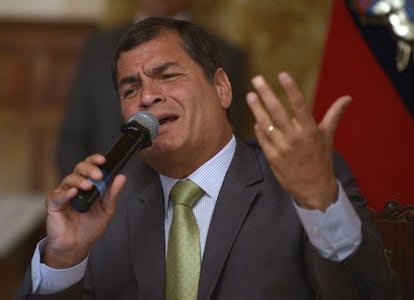Is enmity toward US the real reason for Assange's asylum?
Ecuadorian commentators suggest Correa has other motives

The president of Ecuador, Rafael Correa, and the founder of WikiLeaks, Julian Assange, have a lot in common, and have evidently been on friendly terms for a long time. But the decision by the South American country to grant the Australian asylum has created controversy in Ecuador.
The government of Quito insists that neither Britain nor Sweden are offering Assange sufficient legal safeguards. But several analysts feel the decision goes beyond Correa's anti-US sentiment, and is in fact an attempt at cleaning up his own image after several global organizations accused him of limiting press freedom in his country.
The Ecuadorian government and Assange's legal defense team claim that there are secret proceedings underway in the US aimed at getting the ex-hacker convicted. Ecuador's Correa reiterated last Saturday that his decision to grant Assange asylum is based on the fact that London and Stockholm have not offered guarantees that Assange will not be extradited to a third country (i.e. the US), which "could place Assange's life, or his freedom, at risk in a permanent way."
Correa also added that "Julian Assange has never sought to avoid, nor has Ecuador sought to shield him from, the judicial proceedings underway against him in Sweden."
Correa argues that Assange's asylum is proof of Ecuador's press freedom
In the two months that the Australian national has spent in the Ecuadorian embassy in London, the expressions of affinity between Correa and Assange have come thick and fast. Take last April's interview for the TV channel Russia Today, in which Correa tells Assange: "Welcome to the club of the persecuted." The WikiLeaks founder replied: "Thank you. Take care. Don't let yourself get killed."
In his Saturday programs, the Ecuadorian leader has also referred to Assange as a man who is being "persecuted, slandered, and lynched by the media."
But José Ayala Lasso, a former UN High Commissioner for Human Rights and former government official in Ecuador, believes that what brings both men together is shared anti-US sentiment.
"Faced with something that seems inexplicable from the point of view of Ecuador's interests, one needs to find an explanation, and the one I have found is their shared feelings of enmity toward the United States," he told EL PAÍS.
Ayala said that Ecuador "bought itself somebody else's lawsuit" in 2010, when the deputy vice-chancellor Kintto Lucas offered Assange "residency." At the time, Correa wrote that off as a personal statement by that particular government official.
Mention must also be made of Correa's constant tug-of-war with the main private media outlets in his country. The president has stated that the fact that "the symbol of freedom of expression," in other words Assange, should request asylum from Ecuador is proof that his country does not curtail freedom of expression.
Ayala Lasso says this is an attempt at defending "a freedom that he attacks on a daily basis," and "an expression of total hypocrisy with regard to the government's behavior, which is contrary to the freedom of informing and being informed."
Diego Cornejo, executive director of the Ecuadorian Association of Newspaper Editors, agrees and says the government is "trying to clean up its image abroad. [...] Correa's image outside his country with respect to freedom of expression and independent journalism is completely negative, and that is what he is trying to repair, using Julian Assange."
Tu suscripción se está usando en otro dispositivo
¿Quieres añadir otro usuario a tu suscripción?
Si continúas leyendo en este dispositivo, no se podrá leer en el otro.
FlechaTu suscripción se está usando en otro dispositivo y solo puedes acceder a EL PAÍS desde un dispositivo a la vez.
Si quieres compartir tu cuenta, cambia tu suscripción a la modalidad Premium, así podrás añadir otro usuario. Cada uno accederá con su propia cuenta de email, lo que os permitirá personalizar vuestra experiencia en EL PAÍS.
¿Tienes una suscripción de empresa? Accede aquí para contratar más cuentas.
En el caso de no saber quién está usando tu cuenta, te recomendamos cambiar tu contraseña aquí.
Si decides continuar compartiendo tu cuenta, este mensaje se mostrará en tu dispositivo y en el de la otra persona que está usando tu cuenta de forma indefinida, afectando a tu experiencia de lectura. Puedes consultar aquí los términos y condiciones de la suscripción digital.








































